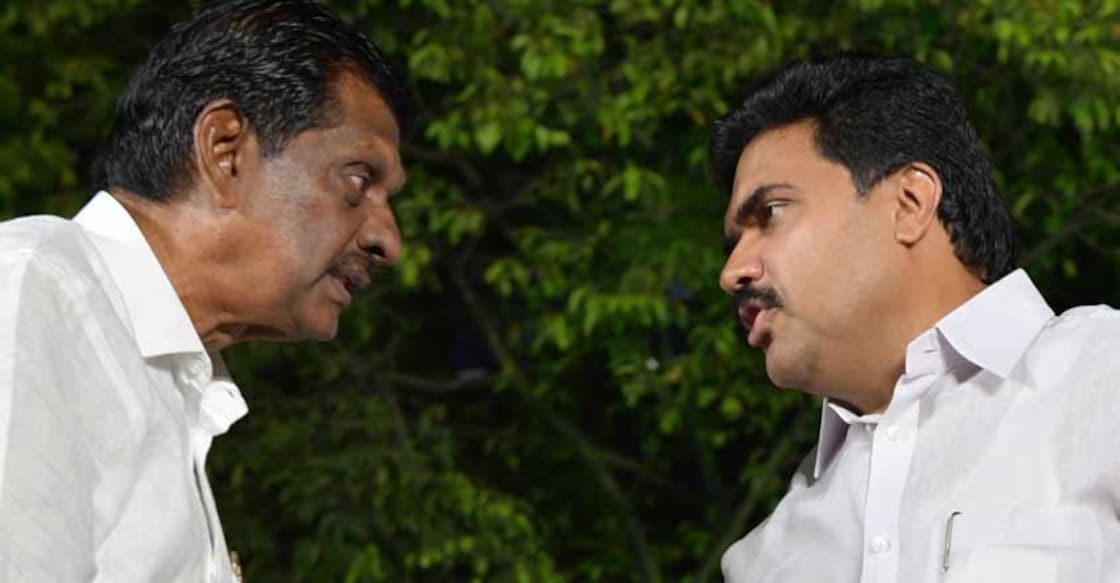Is Kerala Congress strong enough to survive another split?

Mail This Article
The Kerala Congress, like the Dravida Munnetra Kazhakam (DMK) in Tamil Nadu, partly owes its genesis to a regional reaction against the totalitarian tendencies in the Congress in the 1960s. While the DMK emerged to be a key national player, the Kerala Congress is staring at its 11th split.
The opposition parties look forward to the DMK for leadership. Even the Congress, the CPM, the CPI and the Muslim League relied on the DMK to send their representatives to the Lok Sabha in the just concluded general election.
The Left parties have woken up to the new reality. Though a merger between the CPM and the CPI, as the latter desperately proposes, might not happen in the near future, they are moving in the same direction. Smaller parties did not have an encouraging message from the people’s verdict.
Writing on the wall
As far as the Kerala Congress is concerned, its leaders have turned a blind eye to the writing on the wall. They are yet to admit the fact that they have lost key bargaining power with the demise of their leader, K M Mani, who could stand shoulder to shoulder with any leader in the state.
Far from forming a collective leadership and steering the party to new heights, Kerala Congress leaders are at each other’s throats, miserably feeding social media memes and television comedy shows.
The party’s allies in the United Democratic Front are not amused. The Congress and the Muslim League have sent out strong signals against the mudslinging in their ally. Even the ruling Left Democratic Front is not excited about the fissures in the key opposition party.
The Kerala Congress was formed with a basic constituency of farmers. Most of the party supporters later diversified into other areas. Now, the party can no longer claim to be a farmers’ party. The farmers do not look up to the party as their saviour and they are least bothered about the factional feuds. The Church, which had always aligned with the Kerala Congress, has made no secret about its opposition to the fights in the party.
In a meeting held in the bishop’s house in Pala, religious leaders told P J Joseph, Jose K Mani and C F Thomas not to expect any support in the event of a split. Even the Nair Service Society has made it clear that it was on the same page. In short, every constituency of the Kerala Congress is dead against a split in the party.
Behind the split
Then what could be the motivation for P J Joseph and the junior Mani to part ways? Soon after the death of Mani, the group leaders aligned with him met in his house in Pala to work out a practical formula to steer the party. C F Thomas was proposed to be the party chairman and Jose K Mani the vice chairman, while P J Joseph was allowed to be the parliamentary party leader.
The meeting entrusted Joy Abraham to present the proposal to Joseph. The veteran leader saw through the plot. He rejected the formula since it allowed Jose K Mani and C F Thomas to wrest complete control of the party. He wanted nothing less than the party chairman’s post. Though Jose K Mani was seen as his father’s political heir by many, his detractors in the party objected to him being anointed as either the chairman or the vice chairman. They lost their confidence in Joy Abraham, who had the unenviable job of mooting compromise formula after compromise formula.
Joy Abraham eventually shifted his loyalties and tapped into his long association with C F Thomas. Though Jose K Mani tried desperately to keep C F Thomas in good humour - he met the senior leader six times with an offer of any post he seeks - he did not succeed in his manoeuvres.
With C F Thomas on his side, P J Joseph knew he had the majority in the parliamentary party. He offered the lesser post of deputy chairman to Jose K Mani.
The shamed Mani quickly convened the state committee of the party and assumed the position of party chairman.
The motives behind the split were purely based on a bickering over the control of the organisation. There was not even an ideological facade to justify the latest split. Party legislators Roshy Augustine and N Jayaraj, who were known for their retorts to P J Joseph, aligned behind him in the Assembly. Reasons are simply pragmatic.
Rules regarding defection in a parliamentary party are no longer riddled with loopholes. A split could eventually lead to the disqualification of most legislators and local body representatives of the party. The rebel faction would have a tough time forming a parallel organisation in all 14 districts.
The most immediate challenge, however, is the upcoming byelection in the Pala assembly constituency, which was held by K M Mani since its inception. Mani managed to retain the seat even in his darkest hour though the NCP had been consistently denting his vote base.
The Kerala Congress would face an existential crisis if the NCP wrests the prestigious seat in the byelection. That thought should be enough to persuade P J Joseph and Jose K Mani from withdrawing from their ego trips.

